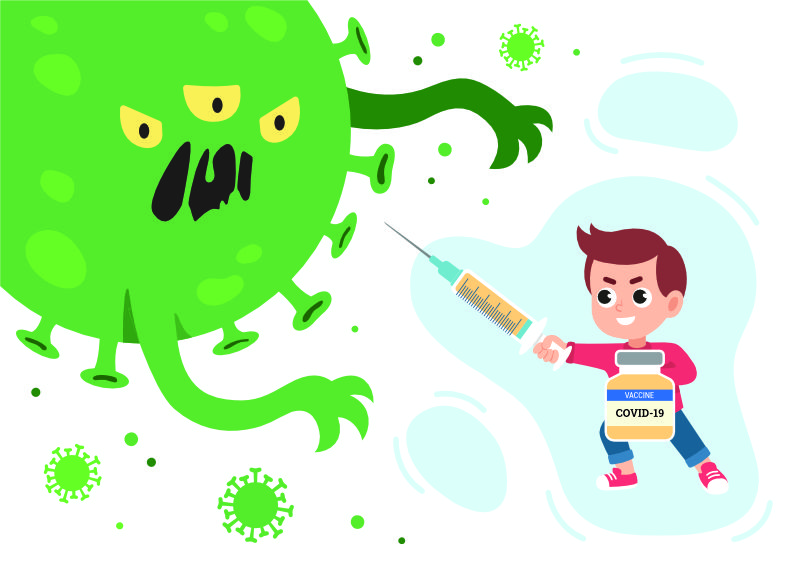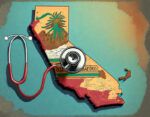Vaccinating California’s Youngest Kids – What Parents Need to Know
As California public health officials roll out distribution of the infant and toddler vaccines to physicians and clinics, at a briefing co-hosted by Ethnic Media Services and Vaccinate All 58 with the California Department of Public Health, June 23, speakers – Dr. Lucia Abascal, California Department of Public Health; Dr. Jennifer Miller, Pediatrician, East Bay Pediatrics; Dr. Voltaire (Volt) Sinigayan, Physician, UC Davis Health; and Dr. Sarah Takekawa, Obstetrician-Gynecologist, Kaiser Permanente, South Sacramento – explored what parents and caregivers need to know about vaccinating California’s youngest kids, especially those age six months to four years, against COVID-19.

The U.S. Food and Drug Administration authorized emergency use of two COVID-19 vaccines made by Moderna and Pfizer Bio and Tech for children six months to four years old, June 17.
Vaccination is an important tool to protect their long-term health against COVID-19 and helps achieve full family protection against this deadly virus.
The approval came on the heels of news that COVID-19 is now the fifth leading cause of death in children one to four-years-old, and the fourth leading cause of death in children younger than one.
Dr Lucia Abascal with the California Department of Public Health gave an overview and explained, “We’ve seen an increase in cases in California, and globally. In California, the curve seems to be flattening out but we’re still seeing, in some spaces, a lot of cases this is due to the highly contagious Omicron variant that have been circulating, so there is still a need for vaccinations for the whole population.
“We have a new population that has a vaccine available for them. There’s this idea that Omicron is milder but if we look at children’s data, in this age group we can actually see that hospitalizations picked the record in January-February, when the Omicron surge started for this group, as well as deaths.
“There is a need to vaccinate young kids. The misconception that kids are safe; that nothing happens to kids; is wrong. There’s more evidence that kids are at an acute risk of being hospitalized for COVID.
“Kids can also suffer from consequences such as multi-inflammatory syndrome and lung COVID has also been reported in kids. So, there’s definitely need to protect these young kids.
“We also know that even though people can get COVID vaccinated, as we’ve seen in adults, children can also get COVID, but protection for severe disease is there and that’s what we saw and with the FDA’s authorization.
“An independent expert panel went over the data that both Moderna and Pfizer submitted they all voted unanimously to recommend that the FDA approve the vaccine.
“We did see efficacy that was expected with vessel variants that are circulating now so we know that the vaccine works and another thing that was presented was the safety profile of both vaccines, and we were shown that both vaccines were safe.
“After the FDA, the CDC makes public health recommendations from the federal level to states, and they approved it as well. Going down to California, California goes over the data and as with the neighboring states, they decided that it was the best for children in California to get the vaccine.
“A while back the state started working directly with pediatricians for them to get enrolled in a program to receive the doses they might need. Federal regulations don’t allow pharmacists to vaccinate children under three. We have the bigger group between six months and three years that will need to go either directly to their pediatrician or small community clinics that will be set up depending on the county where children live.
“It is important that parents reach out to their care providers for this. We don’t have mass vaccination sites or big access with pharmacies. The state has purchased enough vaccines for every child in California, and they will start coming in batches.
“For Moderna, we have the first dose, then a month wait, and then the second dose, so we would expect children to be fully vaccinated two weeks after their second dose.
“For Pfizer, it will take a little bit longer. We’ll have the first dose, then 21 days later, children can get their second dose, and then 60 days later, children can get their third dose.
“Both are very safe, but some immediate side effects were seen with the Moderna. Children had a more fever and more irritability after the Moderna vaccines than the Pfizer. These were minor, treated at home, and disappeared after two days, so both safety profiles are very good, very positive, we did not see any severe effects in children.
“We have to wait and see side effects that children can develop,” concluded Dr Abascal.
Dr Jennifer Miller, a pediatrician with East Bay Pediatrics said, “I’m seeing three major groups of patients and families. The first group are families that are anxious to get their children vaccinated. The second group are families that thought they were ready. They were excited about the vaccine but now that the vaccine is here, they’re having second thoughts. They believe in science, they’re protective of their children, but they have a healthy fear of the unknown. They have questions and they don’t feel so confident about moving forward until they have more answers. The third group of families are parents that just are not going to get their kids vaccinated. They might have vaccinated themselves, but they don’t feel comfortable getting their kids vaccinated. They don’t feel that the vaccine is safe. They don’t feel that it’s necessary, and they’re afraid of the side effects, the complications from the vaccine, and their fate of the long-term effects of the vaccine. They will not get it until it’s officially approved by the FDA, not just an emergency use authorization. They’re afraid of myocarditis and fertility issues.
“I remind families is that these are a sign that your immune system is activated. It’s there to protect you. Families are concerned about fertility issues.
“Several moms have told me that the COVID vaccine affected their previously normal menstrual cycle which now that they got the COVID vaccine, the menstrual cycle is irregular. They’re worried about this affecting the fertility of their teenage daughters. There’s no data, that supports this.
“Other families are worried about myocarditis or inflammation about the muscles of the heart. This is traditionally seen in older adolescent males more than anybody else, but what the data has shown is that COVID virus itself causes much more severe cases of myocarditis, than the vaccine does.
“In cases where kids had myocarditis after the vaccine, the cases were short-lived and self-limited, and were mild.
“Many families are worried about the unknown. They say they’ve had COVID, it was a mild case, they’re comfortable with getting it again if that happens, but they’re not comfortable with what the vaccine may or may not do to them.
“They feel more comfortable chanting that they’re going to get another COVID illness than trying a new vaccine.
“Patients are also saying that the vaccine was approved too quickly, that it was not appropriately vetted. Families suspect that corners were cut or steps were skipped when in actuality, it required three phases of clinical testing as all drugs do.
“Some of the differences with the COVID vaccine’s approval is that many of the steps were done concurrently instead of one phase leading to another phase, leading to another phase, many of the phases were done at the same time. In fact, manufacturing was started on many of the vaccines before the trials were even complete, which also allowed for the process to be sped up.
“In addition, because of the widespread nature of the pandemic, so many families were concerned there were lots of volunteers that were willing to participate in the vaccine trials which made it easier for the companies to get participants, but the big picture is that no corners were cut. This vaccine is now going to be the most heavily studied vaccine in history.
“Knowing these concerns and these fears, I let families know that this vaccine was built on over 20 years of science. The science behind this vaccine is not new, it is normal to be afraid of the unknown and want to protect your child, and with that in mind, vaccination is the best protection.
“I also try to remind families that the decision not to vaccinate is the decision to get the Coronavirus. There’s no predicting how severe that will be. You are taking a chance that it will be mild, however, one in five hospitalized children end up in the ICU.
“During the Omicron surge, children under age four were hospitalized five times more than during the Delta surge. In the United States, 12 million children have had COVID 19. 120,000 have been hospitalized, and close to fifteen-hundred of them, have died in California. We’ve had over nine hundred cases of multi-system inflammatory syndrome.
“The vaccine prevents serious complications like long-term COVID, multi-system inflammatory syndrome, hospitalization, and death,” advised Dr Miller.
Dr Sarah Takekawa, Ob-Gyn with Kaiser Permanente in South Sacramento, with her husband, is raising three children below the age of five, one of whom now has COVID, spoke about their experience as parents and her personal experience with being pregnant and having a baby during COVID while she took all the vaccines as they were made available. She said the pregnancy was fine, normal and she had absolutely no issues which many fear about when they choose to forego their vaccinations. She also talked about how it is important to vaccinate kids as soon as they are eligible to simply mitigate the risk and conditions that can come with COVID, and that those vaccines are safe.
“Talk to your doctor, talk to your pediatricians, if you’re afraid, if you have questions, if you have concerns, reach out to your child’s pediatrician talk to your child’s pediatricians and get your questions answered from the people who know not listening to what’s on social media, not listening to what politicians are saying, not listening to what is on the news. Talk to people that you know, and you trust, and bring your children and get them vaccinated,” said Dr Miller, which had resonance with all other doctors and speakers on the panel.


